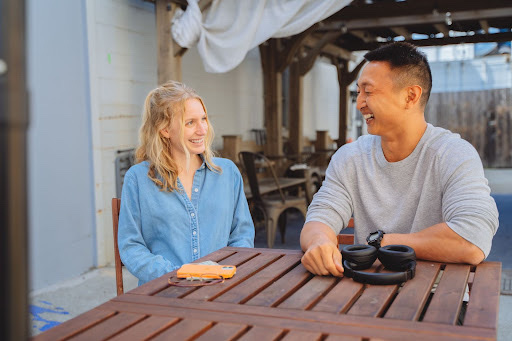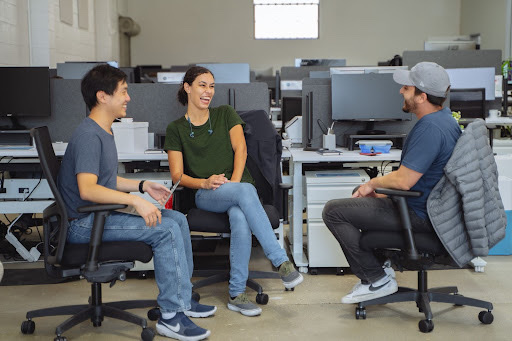
Building Octant's Culture
Building Octant's Culture
For years, my co-founder Sri and I have talked about the company we want to build. We would typically frame that through our own ethics and values. We’d ask each other: what’s the company we’d want to work at for a very long time? We intensely debated decisions that, seemingly tactical in the moment, we believed would have a lasting cultural impact.
We’ve tried to make decisions in value-driven ways. But “company values” were usually mostly an aspirational notion. At our company offsite in mid 2021, we all discussed what aspects of the company Octonauts were most proud of, and what we hoped for future-Octant. Octonauts used words like:
While admirable qualities in the abstract, we hadn’t yet lived all those qualities, and hadn’t discovered what trade-offs would be required to live up to them. It was easy to recite a set of values and map them anecdotally into our culture...

But who are we, really?
Sri and I recently set aside some time to work on our first explicit culture inventory. In this exercise, we did not try to list values in terms of what we profess we are, or would like to be, but tried to think through the hard choices we make – what we actually do – and what we think they say about us. We took some time to distill what we’ve been doing at Octant, what we think it tells us about Octant’s culture, and how we think Octant’s culture is different from places we’ve worked in the past:
Octant is a very transparent company. We’re willing to share almost anything about Octant with any Octonaut. We trust Octonauts, that they have good intentions, and that more information helps them do better work. This has included detailing our compensation practices, board documents, internal strategies and datasets, our bank balances, our wins and losses on deals/fundraising, and more. There are risks with this approach. Excess information sometimes results in incomplete- or misunderstanding (for example, some compensation discussions have led to disruptive debate and internal turmoil). Also, leaks can cause regulatory and competitive problems, so we limit access to information (for example, molecular structures and personal information) when most Octonauts agree a leak would be disproportionately damaging to the value of sharing the information.
We practice being direct with each other. We vigorously debate each other’s ideas and conclusions and try not to take it personally. This requires us being vulnerable to sharing and receiving feedback, even though it can get intense and uncomfortable. We’re committed to improving our skills at giving and receiving feedback so that it’s less uncomfortable over time. For example, we do frequent feedback training, devote significant time to our non-anonymous performance review process, and we (Ramsey and Sri) share our own reviews with the entire company.
We’re serious about developing, leveling-up, and promoting Octonauts from within. We expect outsized performance from each other, which can feel demanding. We value and work hard to provide opportunities to learn and grow. This is reflected in programs such as the Octant Apprenticeship, learning & development sessions, and our monthly lessons-about-startups lunches. We do career development cycles regularly and expect Octonauts to put in the work and take them seriously. We frequently promote Octonauts into roles they probably wouldn’t hold as early in their careers at other companies – but the performance expectations are just as high. This is often uncomfortable– taking on new responsibilities is a struggle and hard work. Octonauts sometimes find out they do not like, or are not great at, their new roles, which can be frustrating for people who have outperformed for most of their careers.
We try to be fair, even when it’s hard. We want Octonauts to feel that they’re being cared for, and not to have to worry about politicking or internally negotiating. It’s an ideal we’ll never perfect, but worth fighting for. For example, we try to be very consistent about compensation, calibrating and screening for bias. And when an offered candidate is negotiating for higher compensation than our range for the role, our policy is to either adjust the range and salaries of all Octonauts with that role (and we’ve done that many times now), or say no. This makes it harder to close candidates, but it’s worth it. Also, fairness doesn’t always mean equal – Octonauts performing at a higher level get paid more.
It’s the world v. disease, not us v. the world. We don’t over-index on competition. We engage in community building in the scientific and our local communities. We share our advances with the scientific community (e.g., Octopus), and we offer our technology for societal benefit (e.g., SwabSeq). Of course we must balance such sharing with preserving returns on our investment, but we default to openness unless there’s a compelling need to protect something.
We are ante-disciplinary. We believe that rapid progress is more likely when interdisciplinary people invent new ways to look at the world. This requires intense collaboration– teaching and learning across boundaries. We prioritize cultivating expertise in the problem itself over growing disciplinary silos. This can make it harder for an Octonaut to map their growth in the context of a traditional career path for their field. It also means we don’t always have the deep expert yet in a particular subdomain. We do and will continue to add such experts when necessary, but our core advantage comes from seeing problems through new paradigms.
We prioritize solving problems in human disease. Our technology development flows from trying to build drugs against important diseases, rather than chasing scientific understanding or scale for their own sake. We’re at our best when we’re doing rather than theorizing. We learn from executing on the simplest solution quickly, rather than comprehensively exploring the solution space. This means failing early and often, which can feel bad, and sometimes resisting pursuit of new technologies or scientific discoveries until we can articulate how they contribute to solving the problem. It also means that Octant is not always the best environment for research scientists who primarily want to follow their curiosities.
Work in Progress
We strive to be honest and reflective about whether our actions live up to our standards. For this culture exercise to have integrity and serve as more than just words, we tried to take a genuine accounting of how we’ve actually operated as a company in contrast with other cultures Sri and I have each worked at.
This isn’t a complete picture of who we are and what we value (that’s a valuable exercise for another day). For example, though we’ve valued building a diverse and inclusive company, our leadership team is not yet reflective of what we aspire to on that front, and that’s because we haven’t put in enough work to make it so. We also wish we could say that Octant has been a garden for Octonauts to pursue their curiosities and incubate their bold new ideas, but it’s not always like that– we’re still a scrappy startup trying to earn our next couple years of existence, which requires relentless focus.
None of the above is set in stone. There are many more things we aspire to be. We expect to change, both intentionally and also because size will sometimes force us to. And we’re looking forward to sharing more about that as we grow.


Ramsey

